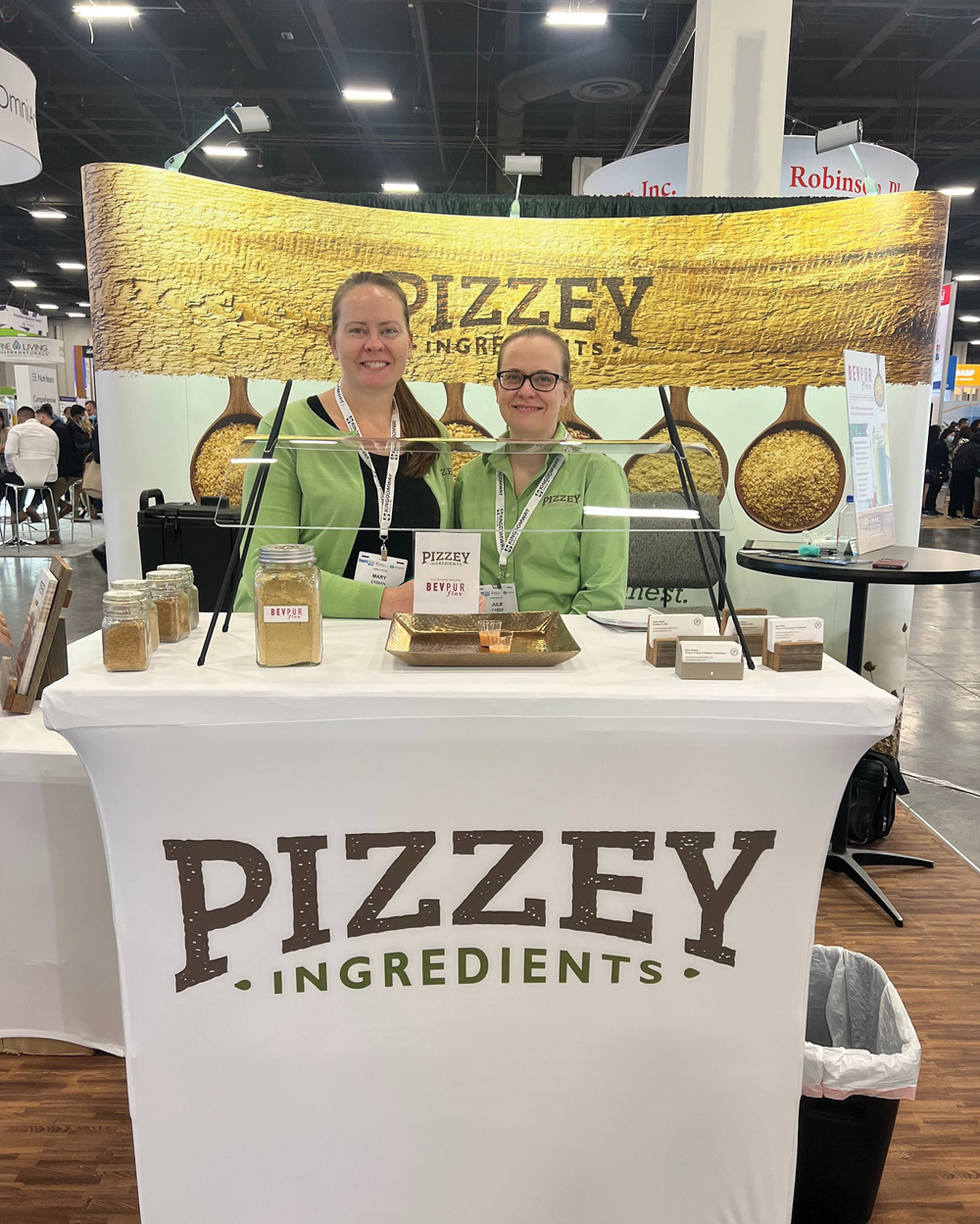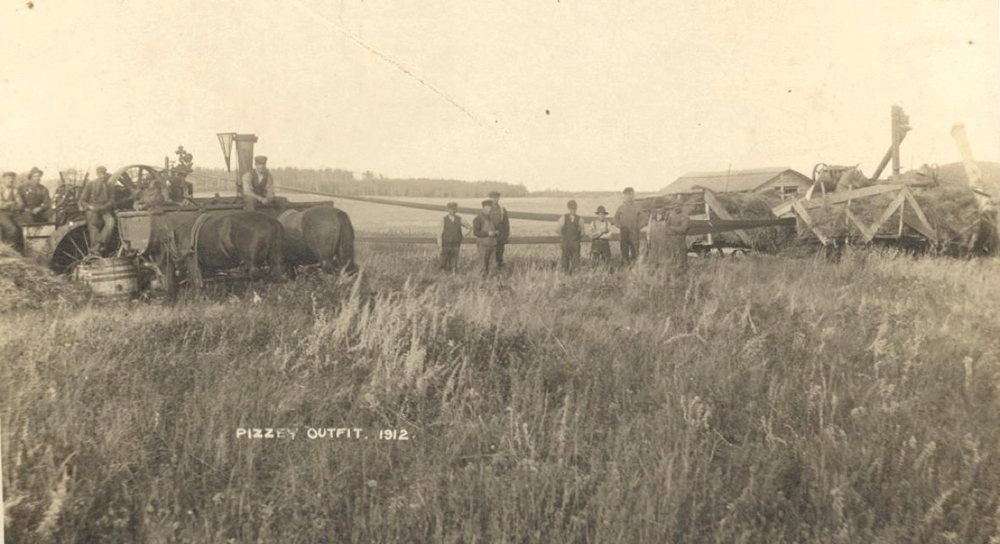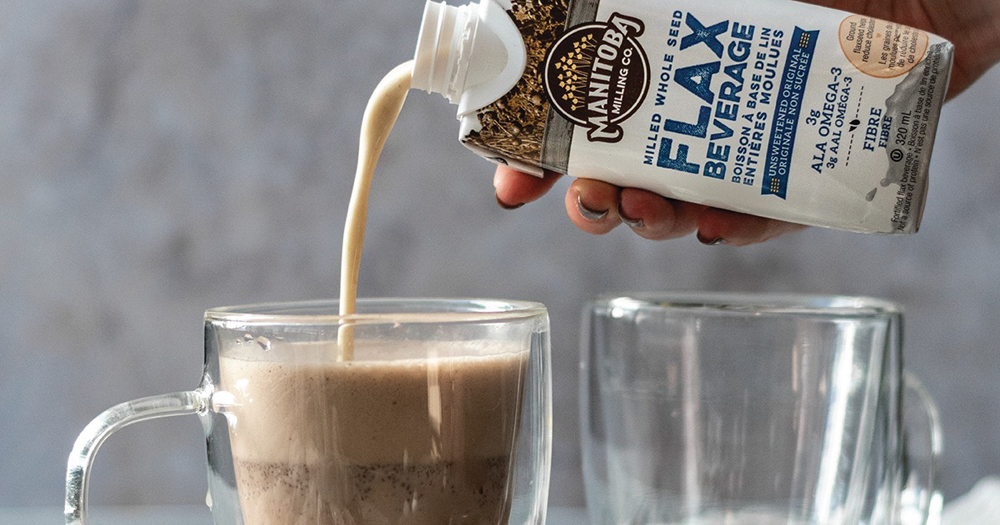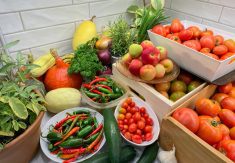Three sisters from Russell are forging a new path with a plant-based ‘milk’ they say is packed with benefits.
“It’s not only a dairy-free option. Flax seed is full of other nutritious properties,” said Mary Ekman, CEO of Manitoba Milling Company.
The company is the retail arm of flax processor Pizzey Ingredients. The three Pizzey sisters — Mary, Julie and Lisa — are co-founders, while their parents, Glenn and Linda Pizzey, founded Pizzey Ingredients.
Read Also

VIDEO: Manitoba’s Past Lane – Jan. 31
Manitoba, 1946 — Post-war rations for both people and cows: The latest look back at over a century of the Manitoba Co-operator
Oat, soy, almond and other plant-based milk alternatives have exploded onto the market in the last decade, but flax is a relative newcomer—not unlike flax itself, which Ekman’s parents helped push into the health food spotlight.
More than 100 years ago, the Pizzeys arrived in the Russell area and soon started growing flax.
In the late 1980s, Glenn Pizzey became fascinated by flax’s nutritional properties, according to Manitoba Milling’s website.
Flax is high in omega-3 fatty acids, “good fats” that can help lower cholesterol, according to the Mayo Clinic’s website. Flax also contains lignins, which have antioxidant properties, and contains fibre.
However, at the time, flax was mostly raised and sold for industrial purposes like linseed oil and linoleum, said Ekman, and people were reluctant to eat it.

Glenn and Linda Pizzey believed people would benefit from eating flax and decided to do something about it.
On the company’s website, Linda Pizzey recounts how she started their first flax food business in 1990. She started baking flax bread in her home and selling it at the Russell farmers market.
“By the end of that summer I had a great following,” she wrote.
In 1991 they started a small commercial bakery from the family home and sold bread to grocery stores, later expanding to a refurbished outbuilding on the farm.
They also started milling flax and selling bread mixes and milled flaxseed to a bread company.
Food companies weren’t easily sold on flax, Ekman told the Co-operator. They were concerned that it was unstable and would go rancid.
Glenn Pizzey, the “scientist in the family,” said Ekman, spent hours figuring out what caused milled flaxseed to oxidize. This led them to set strict parameters for their own milled flax. Diseased, broken or immature seeds can spoil a batch but this has become less of an issue as farming practices have improved, Ekman added.
Leaving the farm
While their roots are in Manitoba, all three Pizzey sisters left the farm as young adults and ended up in the United States.
Ekman’s journey led her from the University of Manitoba to North Dakota State University in pursuit of a degree in food science. Out of college, she got a job with an American dairy company, met her husband and stayed in the area.
Now she has returned to the family business as director of strategic development and sales with Manitoba Milling Co.
Her food science background is helpful for product development, said Ekman, but over time she realized business was her niche.
Younger sister Julie Faber also detoured through the food field before returning to the family business, said Ekman. Faber moved to New York after high school for culinary training. But the chef’s life wasn’t for her, and she pivoted to the legal field.
Today, she’s director of marketing and compliance with Pizzey Ingredients.
Eldest sister Lisa Bergh married a North Dakota farmer. She is a pharmacist and has a more part-time role with Manitoba Milling Co.
Their brother holds down the fort at the family farm, which still grows some of the flax processed by Pizzey Ingredients.

Plant-based milk path
The Pizzeys felt that flax had more to give. They had a finely milled flaxseed that was easier to incorporate, in their view. Ekman said she tried for four or five years to get food companies to buy it, but they proved reluctant.
In desperation, they decided, “we’ll just do it ourselves,” Ekman said. They began selling as Manitoba Milling Company in 2017.
They began experimenting with turning their flax powder into a milk beverage. This project found a boost in a nutrition study with researchers out of St. Boniface Hospital, who were looking for an easy way to feed flax to test subjects.
Unlike some flax milk made with flax oil, Manitoba Milling Co.’s milk is made with whole milled flaxseed, which is exactly what the researchers were looking for.
“One thing that research isn’t fully clear on yet is what portion of the flax is giving the heart health benefit,” Ekman said.
Manitoba Milling pushed the amount of flax in the milk as high as possible, so each serving contained 15 grams of flax. According to Health Canada, 40 grams of whole flaxseed daily has been shown to help reduce cholesterol.
The high flax content in the milk makes it an easy to consume the recommended amount, Ekman said.
The path to get flax milk on shelves has not been easy, but not because of the ‘ick factor’ objections their parents faced in the ‘90s.
Plant-based milks, particularly oat milk, have boomed and are taking up manufacturing capacity, Ekman said. As the new kids on the block, Manitoba Milling Co. has had difficulty finding space in factories.
When Ekman spoke to the Co-operator on Sept. 26, they’d seen their most recent manufacturing run delayed from June to September. It was supposed to run the next day, but Ekman was afraid to ‘jinx’ it.
“I never imagined that would be our biggest challenge,” she said. “It’s just been beyond frustrating. We’ve got people wanting it, we’ve got chains wanting to take it.”
















